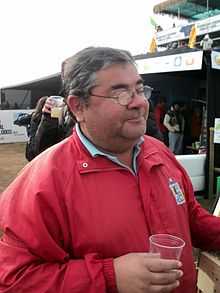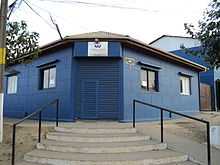Pichilemu political controversies
The 2003–2009 Pichilemu political controversies were a series of controversies in Pichilemu Municipality in Chile that primarily involved Mayor Jorge Vargas González, his successors Víctor Rojas and Marcelo Cabrera, and municipal worker Claudio López.
Background and involved people
Jorge Vargas
Jorge Vargas González, Catholic University of Chile alumni, member of the Christian Democrat Party of Chile and physical education teacher native to Pichilemu, was elected Councillor of Pichilemu in 1992.[1][2] He was later elected Mayor of Pichilemu in 1996,[2][3] and President of the Mayors and Councillors of Cardenal Caro Province in 1997.[4]
On 7 November 1998, Vargas was taken from his office for giving illegally a driver's license.[5] Vargas was responsible for extending, as Judge of the Pichilemu Local Police, an illegal driver license to trader Patricio Muñoz, without knowing that Muñoz was penalized by the Court of Melipilla in November 1998, after he was surprised driving drunk.[5] Mario Madariaga, judge of the Court of Pichilemu, sentenced Vargas to 541 days of dispatched penalty (pena remitida) on 27 August 1999.[5]
Carlos Leyton Labarca replaced Jorge Vargas as Mayor of Pichilemu, from 9 November 1998 until 4 November 1999, when Vargas was acquitted.[2] Vargas then continued his term, and was re-elected in 2000,[2][6] and in 2004.[7]
Víctor Rojas

Víctor Rojas González, a trader and hot dog vendor of Pichilemu, and member of the Christian Democrat Party, started his political career on 2000, when he ran for councillor of the city; he was eventually elected.[6]
Shortly after Jorge Vargas was removed as mayor of Pichilemu in July 2007, Víctor Rojas was elected in a City Council meeting as the next mayor.[8]
Marcelo Cabrera
Marcelo Cabrera Martínez, a politician of Pichilemu, former President of Movimiento Vitalicio por Pinochet (Spanish: Life Movement for Pinochet) and member of Augusto Pinochet Foundation,[9] was elected Councillor of Pichilemu in 2004.[10] In 2008, Cabrera was elected Mayor of the city, with a 42.08 per centage of the votes, surpassing Fortunato Bobadilla Acevedo for more than 1,000 votes.[11]
Miguel González

Miguel Ángel González Carvacho (born 26 December 1963) is a Chilean politician, radio presenter, and currently a worker for the Pichilemu city hall.
González Carvacho was a candidate in the 1992 municipal elections for the Party for Democracy (PPD) of the Concert of Parties for Democracy (Concertación); he was not elected, but eventually got 296 votes (5.00%), from a total of 5,915 valid votes.[12]
He was a candidate for councillor of Pichilemu in the 2004 municipal elections, this time supported by the Humanist Party of Chile (PH) of the Juntos Podemos Más political group;[13] but he was not elected, again. González got 110 votes (1.63%), from a total of 6,752 valid votes.[14][15]
González, along with fellow Pichileminian politician Hugo Toro (UDI), host Enlace Comunal (Communal Link), a radio programme on Jorge Nasser's Radio Entre Olas. In the program, Gonzalez comments along with other public figures of the commune of Pichilemu, "the communal events, and the concerns of the community."[16]
Claudio López
Claudio López Romero was a former Municipality of Pichilemu functionary,[17] who worked as Head of Communications of the Municipality, and had been hired by Mayor Jorge Vargas.[18]
López also worked as television presenter for Canal 3 Pichilemu,[19] and is now employed as journalist for Radio Somos Pichilemu, property of Jorge Vargas and his wife and current councillor of Pichilemu Andrea Aranda.
Video case
In March 2003, Lidia Catalán González, a Pichileminian businesswoman, denounced Mayor of Pichilemu Jorge Vargas González for bribery, claiming that "he demanded her two million pesos in exchange of a municipal permission"[20] to work exclusively in Pichilemu with thirty bicycles.[21] Vargas responded by saying that "all of that is false," and that "there is a group of people behind that woman [Catalán] trying to damage his image."[21]
I went to the town hall, [then I] showed him [Vargas] my project and asked him if he could authorize me to work with thirty bicycles. He said no because they were too many and that he had to ask the councillors. I asked him if he had any problems if I talked with them. He later called me by phone and said: "Lidia, don't talk with the councillors, I'm going to do it for you, but I need two million pesos." I said: "Okay, but only if I get the exclusive permission."— Lidia Catalán, El Expreso de la Costa, November 2005[21]
The case became known as Caso Video, because Catalán recorded the conversations with Vargas in audio and video.[21] According to a University of Chile investigation, requested by the Court of Pichilemu, "the male voice that appears in the video and audio recordings, is broadly consistent with that of Jorge Vargas González (in about a 90%)."[21] Jorge Vargas said on 17 March 2005, that the recordings had been made without his consent, that "[Catalán] conducted the dialogue according to her intentions," and that he had denounced her, because "it is a crime."[21] The conversations took place in December 2002.[21]
The Appeals Court of Rancagua decided to process Jorge Vargas, after Rodolfo Morenos, Judge of the Court of Pichilemu said that there was not enough evidence.[21]
Lidia Catalán told El Expreso de la Costa that she had been offered money to withdraw the lawsuit.[21] During the trial, Miraldo Antonio Saavedra, and Wilson Raúl Covarrubias, testified to the Criminal Court of Pichilemu that Vargas had paid them 1,600,000 pesos to testify in his favor.[20] Both were later condemned for the crime of perjury.[20]
In March 2006, the Criminal Court of Pichilemu declared Vargas guilty of the crime of bribery, and condemned him to 541 days of dispatched penalty, to pay a fine of 4 million pesos and a 7-year restriction to hold public charges. Vargas remained in custody in the Santa Cruz Prison.[20] Jorge Vargas appealed the sentence, but on 7 June 2007, the Supreme Court of Chile rejected it, and confirmed the guilty verdict by the Court of Pichilemu, later ratified by the Appeals Court of Rancagua.[22]
Alfredo Zúñiga sexual abuse case
On 23 June 2004, Alfredo Zúñiga Caro, boyfriend of Paulina Nin de Cardona, a television presenter who was running for mayor that year, was detained by the Sexual Crime Investigation Brigade (Brigada de Delitos Sexuales de Investigaciones) over sexual abuse to his three-year-old daughter,[23] as ordered by Judge Marcela Cisternas, from the Crime Court of Pichilemu.[24]
Zúñiga was denounced by his mother, Cecila Caro Salinas, along with her niece, Macarena Illanes,[23] on 9 March 2004.[24] The victim is the daughter of Zúñiga and Cecilia Irarrázaval González, nicknamed "La Congrio".[25] Paulina Nin told press that Jorge Vargas, Mayor of Pichilemu was generating controversy due to her candidacy for Mayoress, and had offered Irarrázaval González "to expand her house, make a second floor [...] in exchange for debunking Alfredo [Zúñiga]."[25] Nin also assured that Vargas had "five criminal complaints, 120 lawsuits, and his wife [Andrea Aranda] found him with a lover in a motel."[23]
Cecilia Irarrázaval told La Cuarta that her daughter "had been touched by her father," and that "her vagina looked like if it had been raped."[24] Zúñiga was taken to the Prison of Santa Cruz on 24 June, where he was interrogated along with Irarrázaval, Cecilia Caro (Zúñiga's mother), and Paulina Nin, who voluntarily asked to be interrogated.[24] Cecilia Durand, Director of Servicio Nacional de Menores (National Service of Minors) in the O'Higgins Region, told La Red's En Portada on 27 July 2005 that the case was closed and Zúñiga would be sentenced that August.[26]
In November 2005, Zúñiga was acquitted of the charges by Rodolfo Moreno, in the Court of Pichilemu.[27][28] Durand announced she would appeal the decision in the Court of Appeals in Rancagua.[27] However, the court confirmed Moreno's resolution, because "the evidence given in the process did not allow to confirm the existence of the crime," in March 2006.[29]
Calendarios case
In April 2003, the councillors of Pichilemu Roberto Córdova, Aldo Polanco, Washington Saldías, and Carlos Leyton filed a complaint for the crimes of embezzlement, falsification of public documents, fraud, incompatible negotiation, bribery, fraud and conspiracy against the former head of the Department of Community Development of Pichilemu, Héctor Vargas.[30][31] The complainants claimed that money from the Health Department of Pichilemu, especifically from the National Health Fund area, was used for the "creation of printed material for a hantavirus prevention campaign," and "calendars with the image of mayor Jorge Vargas;" the case became known as Caso Calendarios (Calendars Case).[31]
The Caso Calendarios allegation in the Appeals Court of Rancagua was postponed on 13 July 2005.
Parquímetros case
On 29 March 2007, González recorded a conversation, in which then-councillors of Pichilemu Víctor Rojas González (at the time of his arrest, mayor) and Hernán Garrido Salas asked for a bribe of over a million pesos (2,000US$) from the city's parking meter system, which was concessioned by González's wife.[32] It was also pointed out in the recording that then-mayor of the city Jorge Vargas González was "commanding the plan." On 13 September of that year, five workers for the Pichilemu city hall were arrested by the Public Prosecutor of Pichilemu, on charges of bribery, fraud, and conspiracy: mayor Víctor Rojas González; former mayor Jorge Vargas González; DIDECO's chief Gerardo Rubio; councillor Hernán Garrido Salas; and Municipal Administrator Francisco Vidal.[33] During the two years following the events generated by González's denouncement, the mayor office of Pichilemu would be occupied by eighteen different politicians.[8] "Small town, great hell," as Pichilemu has been called, Miguel González told El Mercurio in May 2008 that "[e]very time [somebody] embarks on a project, it seems that it is understood that to apply you have to come with your wallet."[34]
Claudio López case

Claudio López Romero was detained by Brigada Investigadora de Delitos Económicos (BRIDEC – Economic Crime Investigation Brigade),[17] a subdivision of the Investigations Police of Chile, on 9 February 2009 at 19:10 local time (22:10 UTC), after an investigation by the Pichilemu Public Prosecutor's Office.[18] López was accused of fraud against a woman who rented a part of the Pichilemu Municipal Forest for about four million Chilean pesos (8.209,34 US dollars).[17][18]
Notes
- ↑ "Votación Candidatos por Comuna Pichilemu Municipales 1992" (in Spanish). Ministry of the Interior of Chile. Retrieved 4 October 2010.
- ↑ 2.0 2.1 2.2 2.3 Saldías, Washington (2 August 2007). "Alcaldes, Regidores y Concejales de la Comuna de Pichilemu" (in Spanish). Pichilemu, Chile: Pichilemu News. Retrieved 5 October 2010.
- ↑ "Votación Candidatos por Comuna Pichilemu Municipales 1996" (in Spanish). Ministry of the Interior of Chile. Retrieved 4 October 2010.
- ↑ Filippi, Emilio (2006). La clase política chilena. Pehuén Editores Limitada. p. 202. ISBN 978-956-16-0411-7. Retrieved 6 January 2011.
- ↑ 5.0 5.1 5.2 Moreira, Julio César (27 August 1999). "Pena de 541 Días a Alcalde De Pichilemu" (in Spanish). Rancagua, Chile: El Mercurio. Retrieved 5 October 2010.
- ↑ 6.0 6.1 "Votación Candidatos por Comuna Pichilemu Municipales 2000" (in Spanish). Ministry of the Interior of Chile. Retrieved 4 October 2010.
- ↑ "Votación Candidatos por Comuna Pichilemu Alcaldes 2004" (in Spanish). Santiago, Chile: Ministry of the Interior of Chile. 2004. Retrieved 12 January 2011.
- ↑ 8.0 8.1 Pinto, José (11 January 2010). "Insólito, la Municipalidad de Pichilemu en dos años ha tenido 18 alcaldes". Rengo Al Día (in Spanish) (Rengo, Chile). Retrieved 12 January 2011.
- ↑ "Marcelo Cabrera fue electo en Pichilemu" (in Spanish). El Rancahuaso. 26 October 2008. Retrieved 6 October 2010.
- ↑ "Votación Candidatos por Comuna Pichilemu Concejales 2004" (in Spanish). Ministry of the Interior of Chile. Retrieved 7 October 2010.
- ↑ "Votación Candidatos por Comuna Pichilemu Alcaldes 2008" (in Spanish). Ministry of the Interior of Chile. Retrieved 7 October 2010.
- ↑ "Votación Candidatos por Comuna Pichilemu Municipales 1992" (in Spanish). Santiago, Chile: Ministry of the Interior and Public Security of Chile. Retrieved 22 May 2011.
- ↑ "Candidatos por Comuna Sexta Región Partido Humanista". Canal 13 (in Spanish). Santiago, Chile: Luksic Group. 2004. Retrieved 29 May 2011.
- ↑ "Votación Candidatos por Comuna Pichilemu Concejales 2004" (in Spanish). Santiago, Chile: Ministry of the Interior and Public Security of Chile. Archived from the original on 7 July 2011. Retrieved 23 May 2011.
- ↑ "Historial de Candidatos Don (a): Gonzalez Carvacho Miguel Angel" (PDF) (in Spanish). Santiago, Chile: Electoral Service of Chile. 29 May 2011. Retrieved 29 May 2011.
- ↑ Saldías, Washington (23 August 2010). "Pichilemu: la situación hospitalaria, el bicentenario y la política". Pichilemu News (in Spanish) (Pichilemu, Chile). Retrieved 11 June 2011.
- ↑ 17.0 17.1 17.2 Pérez Araya, Mauricio (11 February 2009). "Funcionario municipal de Pichilemu condenado por estafa" (in Spanish). Santiago, Chile: La Tercera. Retrieved 10 November 2010.
- ↑ 18.0 18.1 18.2 Saldías, Washington (10 February 2009). "Claudio López, Ex Jefe de Comunicaciones del ex Alcalde Vargas, detenido por personal de la BRIDEC" (in Spanish). Pichilemu, Chile: Pichilemu News. Retrieved 10 November 2010.
- ↑ Araya J., Francisca (25 May 2008). "Señal 3: dimensión desconocida". La Nación (in Spanish) (Santiago, Chile: Empresa Periodística La Nación S.A.). Retrieved 12 January 2011.
- ↑ 20.0 20.1 20.2 20.3 Instituto Libertad 2007, p. 128–129.
- ↑ 21.0 21.1 21.2 21.3 21.4 21.5 21.6 21.7 21.8 Saldías, Washington (9 November 2005). "Entrevista a Lidia González, querellante en el Caso Video". Pichilemu News (in Spanish) (Pichilemu, Chile). Retrieved 13 January 2011.
- ↑ Saldías, Washington (7 June 2007). "Alcalde de Pichilemu, Jorge Vargas, definitivamente culpable del delito de cohecho". Pichilemu News (in Spanish) (Pichilemu, Chile). Retrieved 13 January 2011.
- ↑ 23.0 23.1 23.2 Freire, S.; Ugalde, J. M. (24 June 2004). "Detenido novio de Paulina Nin". La Nación (in Spanish) (Santiago, Chile: Empresa Periodística La Nación). Retrieved 6 January 2011.
- ↑ 24.0 24.1 24.2 24.3 "Caso pololo de Paulina Nin: Sename anunció querella contra culpable de abuso a menor". La Cuarta (in Spanish) (Santiago, Chile: COPESA). 25 June 2004. Retrieved 11 January 2011.
- ↑ 25.0 25.1 "Paulina Nin acusó a alcalde de Pichilemu de estar detrás de acusación contra su pareja". Radio Cooperativa (in Spanish) (Santiago, Chile: Compañía Chilena de Comunicaciones). 23 June 2004. Retrieved 6 January 2011.
- ↑ "Directora del Sename acorrala a esposo de Paulina". La Cuarta (in Spanish) (Santiago, Chile: COPESA). 27 July 2005. Retrieved 11 January 2011.
- ↑ 27.0 27.1 "En Proceso". El Mercurio (in Spanish) (Santiago, Chile). 8 November 2005. Retrieved 12 January 2011.
- ↑ Saldías, Washington (7 November 2005). "Exculpado Alfredo Zúñiga por el delito de abusos a hija menor". Pichilemu News (in Spanish) (Pichilemu, Chile). Retrieved 13 January 2011.
- ↑ "Absuelto esposo de Paulina Nin". El Mercurio (in Spanish) (Santiago, Chile). 22 March 2006. Retrieved 12 January 2011.
- ↑ Instituto Libertad 2007, p. 124–125.
- ↑ 31.0 31.1 Saldías, Washington (13 July 2005). ""Caso CAlendarios" nuevamente fue pospuesto en la Corte". Pichilemu News (in Spanish) (Pichilemu, Chile). Retrieved 15 January 2011.
- ↑ Saldías, Washington (11 March 2008). "Caso Parquímetros se vé hoy en tribunal pichilemino". Pichilemu News (in Spanish) (Pichilemu, Chile). Retrieved 29 May 2011.
- ↑ Rey, Cynthia (13 September 2007). "Alcalde y ex edil de Pichilemu quedan en prisión preventiva". El Rancahuaso (in Spanish). Archived from the original on 7 July 2011. Retrieved 11 June 2011.
- ↑ Anguita G., María Teresa (25 May 2008). "El "invierno cruel" que azota a Pichilemu". El Mercurio (in Spanish) (Chile: COPESA). Retrieved 11 June 2011. (subscription only, forked at Pichilemu News)
References
- "Informe Especial: Itinerario de la corrupción 1990–2006" (PDF) (in Spanish). XVIII (166). Instituto Libertad. January 2007. ISSN 0717-7933. Retrieved 10 October 2010.